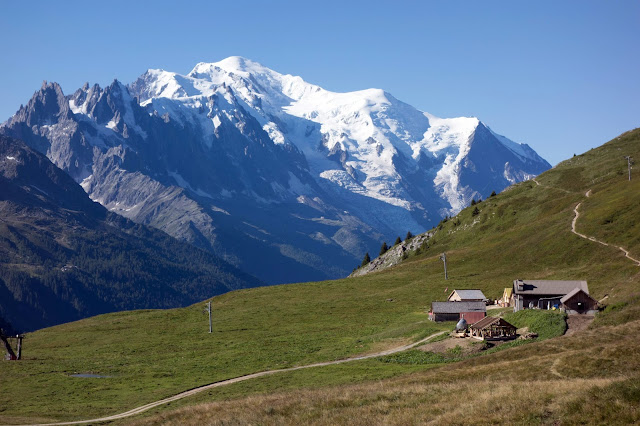With no mountain races of my own this year, I thought I'd have all this time to work on finishing details on my book and post blog updates, but I should have known better. By deciding to play "spectator" to Beat's self-supported race, I had all the same time constraints as a crew-person with none of the actual support. Between occasional work, keeping track of Beat's location, plotting my own trail route to intersect him, driving, and hiking, I rarely made time to sleep and eat actual meals — all of the local grocery stores close before 7 p.m., and who has time to sit at slow-service restaurants? I was raised with American fast food and 24-hour convenience stores, so I had no idea how to function on a less ambitious schedule. Most evenings I'd stumble back from a hike around sunset and scrounge for whatever snacks I had left over in the car. Crackers, tuna, and oranges again? Well, at least there were oranges. I'm glad I bought that two-kilogram bag of fruit on Monday.
The PTL course followed the Tour du Mont Blanc "highway" — as Beat calls it — for a short distance, but true to form left the trail and shot straight up a knife ridge that marks the actual France-Switzerland border, toward Arete des Autannes. This was solid class-three scrambling with occasional sheer drop-offs, but easy compared to a lot of the terrain Beat traverses in this horror of a race. (I'll try to keep my disdain for PTL to a minimum, since the event went well for Beat, and he's proven himself capable of managing everything the organizers have thrown at him in the past five years so far. Few people seem to believe me that PTL is so terrible anyway, since I agree that much of it is fun in smaller doses, and because my complaints are always accompanied by scenic photos.)
I came within fifty meters of the high point on the ridge, but arrived at an exposed spot with few handholds that I wasn't confident I could reverse. Oh well; this little pre-work walk was already up to 4,300 feet of climbing. Down I went.
PTL teams making their way up the easier part of the arete.
I caught up with Beat near the bottom of the valley. He was feeling generally good although tired, of course. They'd had a rough night descending from Mont Buet, another sharp ridge with several miles of class three and class four terrain. It was just before noon and already temperatures had shot into the mid-80s. It would remain hot and bluebird all week, until the last night. This made for a particularly tough week for the competitors, as it's harder to keep calories coming in and stay hydrated in such heat. After a day or two, this catches up with everyone. I maintain that multi-day endurance events are easier to manage in cold weather than hot, as long as you don't have to travel scary ridges in ice, snow, and rain.
On Tuesday night I simulated the PTL experience by grabbing only about 90 minutes of sleep. By the time I finished work it was another beautiful and hot day — too hot to go back to sleep. Beat was out of day-hiking range for most of Wednesday, so I hiked from our place in Chamonix to a trail that ascends a small ridge between the glaciers Bossons and Taconnaz, ending at the point where the two glaciers meet. "La Jonction" is an incredible walk with close-up views of the ice on both sides, but it's another grunt of an effort with 6,000 feet of climbing, and again temperatures were close to 90. Pictures don't really do this hike justice, but I'm posting them anyway.
Typical trail views. And this was a very nice trail! So enjoyable after stumbling along PTL routes.

After a scramble up a broad ridge, the land effectively ends at 8,500 feet on a knob called La Jonction. Here one can only continue higher if they're willing to venture out on a chaotic jumble of ice. But it's an incredible spot to sit and eat crackers and tuna for lunch.
Looking toward Mont Blanc, still 8,000 feet higher. The first men to climb Mont Blanc spent their first night bivvied in this spot, back in 1786. It's incredible to imagine what this must have been like in a time before mountaineering techniques and gear, traveling unroped and without ice axes or crampons, on virgin terrain with no knowledge of what lie ahead.
This is still a common spot for winter ascents of Mont Blanc — there's even an enticing refuge building constructed on top of that black arete. I'm told that summer ascents are more rare, as global warming as reduced these glaciers to the point that they are becoming increasingly more technical and difficult, and volatile seracs pose a menacing risk.
Views into the Chamonix Valley. Despite sleep deprivation this was my best day of the week, probably because I spent the least amount of time fretting about Beat in the PTL. In the evening I had dinner with some British fat-bike enthusiasts who now live in the Chamonix valley. We were four Brits and an American eating in France at a Canadian-themed bar, which I thought was humorous, even though I resisted the urge to order poutine. We enjoyed a fun evening of discussing Brexit and Trump, the difficult and beautiful bike trails in Chamonix, and biking in Alaska. Meanwhile Beat was out on some steep and rocky mountain in Switzerland, making his way into Italy.





































